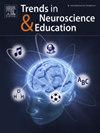The componential nature of school mathematics and associative cognitive factors: The case of young children with mathematical learning disabilities
IF 3
Q2 NEUROSCIENCES
引用次数: 0
Abstract
The current understanding of mathematical and numerical processes indicates that mathematical abilities are not singular. Instead, they consist of multiple components that can be linked to various domain-general abilities. We used network analysis to test the componential nature of school mathematics and the effect of mathematical proficiency on the relations between mathematical tasks. Two groups of typically developing children (TD, N = 64, 40 females, mean age = 9.87) and children with mathematical learning disabilities (MD, N = 64, 47 females, mean age = 9.87) were tested.
Most of the mathematical subjects were closely related. These results suggest that most school mathematical tasks are strongly associated, especially in TD children. Among MDs, we found a more diverse network, with comparison and number line estimation partly separate from other mathematical topics, and negatively associated with reading, thus indicating that number comparison and number line estimation is a focus of weakness in children suffering from MD. These results suggest that most of the school mathematical tasks are strongly associated, especially in TD children. Across groups, it was also discovered that verbal working memory was strongly linked to reading and non-numerical fluency, hence, the connections between mathematical subject matters and reading or non-numerical fluency could be explain by the shared correlation with verbal working memory. Hence, among all the domain-general factors, only verbal working memory was directly associated with mathematics.
学校数学的组成性质与联想认知因素:以幼儿数学学习障碍为例
目前对数学和数值过程的理解表明,数学能力不是单一的。相反,它们由多个组件组成,这些组件可以链接到各种领域通用功能。我们使用网络分析来检验学校数学的组成性质,以及数学熟练程度对数学任务之间关系的影响。将典型发育儿童(TD, N = 64, 40名女性,平均年龄= 9.87)和数学学习障碍儿童(MD, N = 64, 47名女性,平均年龄= 9.87)分为两组进行测试。大多数数学科目都是密切相关的。这些结果表明,大多数学校的数学任务都是密切相关的,尤其是在自闭症儿童中。在MD中,我们发现了一个更加多样化的网络,比较和数线估计与其他数学主题部分分离,并且与阅读负相关,这表明数字比较和数线估计是MD儿童的弱点焦点。这些结果表明,大多数学校数学任务都是强相关的,特别是在TD儿童中。在不同的小组中,研究人员还发现,语言工作记忆与阅读和非数字流畅性密切相关,因此,数学科目与阅读或非数字流畅性之间的联系可以用语言工作记忆的共同相关性来解释。因此,在所有领域一般因素中,只有言语工作记忆与数学直接相关。
本文章由计算机程序翻译,如有差异,请以英文原文为准。
求助全文
约1分钟内获得全文
求助全文
来源期刊

Trends in Neuroscience and Education
NEUROSCIENCES-
CiteScore
6.30
自引率
6.10%
发文量
22
审稿时长
65 days
 求助内容:
求助内容: 应助结果提醒方式:
应助结果提醒方式:


